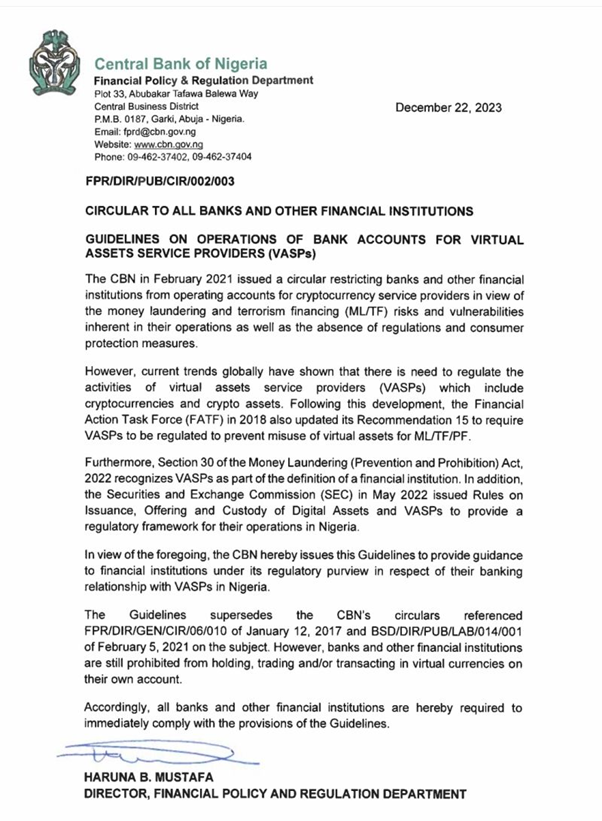
NIGERIA – The ever uncertain position of Nigeria and its CBN
For some time now, the blockchain sector in Nigeria has been lobbying against the circular of February 2021, restricting Banks and other Financial Institutions from operating accounts for cryptocurrency service providers.
In a new circular addressed to banks yesterday (December 22), the CBN acknowledged that the increasing worldwide demand and usage of cryptocurrencies makes the expectations implied in the February 2022 circular directed at financial institutions unsustainable.
Register for Tekedia Mini-MBA edition 19 (Feb 9 – May 2, 2026): big discounts for early bird.
Tekedia AI in Business Masterclass opens registrations.
Join Tekedia Capital Syndicate and co-invest in great global startups.
Register for Tekedia AI Lab: From Technical Design to Deployment (next edition begins Jan 24 2026).
Some are taking this as a good sign, in that it will free up the industry to restore it to its former glory, when it was once the top nation globally, in day trades.
Some are not so sure the measure will not become a double-edged sword.
The concern comes from the coining of a new acronym VASPs – Virtual Asset Service Providers.
Much has happened in the blockchain space since February 2021, Cryptopunks were really the only high profile NFA (Non-Fungible Asset) around; the ‘Bored Apes’ didn’t debut until August the same year.
Now, NFAs encompass tokenizing Digital Art, Music, Animations, Web 3 Domains, RWAs (Real World Assets) In-Game Assets, and a wide range of Digital Collectibles.
The circular quite clearly says ‘there is need to regulate the activities of Virtual Asset Service Providers (VASPs), which include Cryptocurrencies and Crypto Assets.’ They also mention ‘custody of Crypto Assets and VASPs’.
It would seem obvious that the complete virtual spectrum of Assets will now be within the scope of the new circular. ‘Custody’ services will also come under the scope, so proof of trade will not be required to ‘qualify’ for CBN ‘attention’.
Many have referred to the 2021 document as ‘The Crypto Ban’, though it needs to be pointed out, both the 2021 and 2022 circulars represent CBN interpretation of existing law(s) and not the creation or repeal of one.
Sole Write-up.

EU – Discriminative regulatory approach against PoW in the EU
The Open Dialogue Foundation has charged that the EU is adopting a discriminatory approach to PoW (Proof of Work) consensus blockchains in the EU, to the benefit of other (more commercial and centralized) crypto-architectures.
The ODF is seeking support from the public in a European Securities and Markets Authority (ESMA) consultation entitled: “Technical Standards specifying certain requirements of Markets in Crypto Assets Regulation (MiCA)”
The article: ‘Defend PoW: Submission to ESMA’ is written by Lyudmyla Kozlovska and Bota Jardemalie
UAE – The Bite eases for Venom
Venom is a multi-blockchain network consisting of a masterchain (PoS, layer 0), workchains, and shardchains, with its own Virtual Machine. It is based in UAE.
It’s targeting customers who want to establish new products such as NFT marketplaces, derivative exchanges, GameFi, fiat-backed stablecoins, launchpads, and others.
It’s market is focusing on the MENA countries with global aspirations for the future.
In July, Alibek Garcia Isaaev, one of the founders and main investors was involved in legal problems which brought criticism to himself, Venom Blockchain, and its Foundation.
At the time, the media did not treat Issaev kindly and he was serially labelled a “fraudster”; now, he has been cleared of all charges.
Ilya Kligman, a Russian banker has now been found guilty and sentenced to prison in the UAE, being convicted in absentia.
Kligman, currently in Germany, will face extradition to the UAE, and the recovery of multibillion-dollar damages he caused to numerous companies through extortion, blackmail, and obstructing their normal functioning. This includes around a billion due to Isaaev.
Source – Lara on the Block

Buterin has sold tons of Memecoins
Vitalik Buterin recently made a significant transaction involving trillions of meme tokens.
Security and analytics company PeckShield Alerts said a Vitalik labelled wallet address was seen swapping 100,000,000,000,111.111 DOBE tokens worth approximately $22,900 for 10.44 Ethereum tokens (ETH). The wallet also initiated another sale of 1,858,140,000,000 DOJO tokens worth $6800 for 3.12 ETH.
This is on the back of some of his Ethereum crypto wallets becoming short of $29 million between December 15 and 21.
The loss was reported by blockchain analytics service, Arkham Intelligence. The reason was due to crypto market fluctuations which saw Buterin’s wallets losing 5% of the total value of its assets.
Source – Bitcoinist.com
US – CATO Institute slams Bretton Woods Committees’ Call for US CBDC
‘The Cato Institute is a public policy research organization—or think tank—that creates a presence for and promotes libertarian ideas in policy debates. Our mission is to originate, disseminate, and advance solutions based on the principles of individual liberty, limited government, free markets, and peace.’ – from their site.
The Bretton Woods Committee has released a new call for the United States to launch a central bank digital currency, or CBDC. In fact, the report also calls for the Bank for International Settlements (BIS) and the Financial Stability Board (FSB) to take the lead on establishing CBDC rules and standards around the world.
The response article from CATO side came from Nicholas Anthony.
Nicholas Anthony is a policy analyst in the Cato Institute’s Center for Monetary and Financial Alternatives and a fellow at the Human Rights Foundation.
Anthony charges that the Bretton Woods Committee fails to adequately explain why a CBDC is needed.
He also added that it is not a safe assumption to consider central banks more trusted than the private sector (a major plank of the Bretton Woods argument). Pew Research reports that even in the United States, public trust in government is at historic lows.
Likewise, a Cato Institute survey found that 79 percent of Americans trust the private sector to handle their money more than the government.
CHINA – New Regulation sees Tencent shares fall one eighth.
At fairly short notice, Beijing has issued a new set of rules aimed at curbing excessive gaming and spending.
Shenzhen-based Tencent, which owns WeChat and generated over a fifth of its third-quarter revenue from domestic online gaming, saw its shares tumble 12.4% , shaving $43.5 billion off its’ market value. This was its lowest day close since November 2022.
Other losers on the news, NetEase shares plunged 24.6% while Bilibili shares slid 9.7%.
Source – CNBC

9ja Cosmos is here…
Get your .9jacom and .9javerse Web 3 domains for $2 at:
Visit 9ja Cosmos LinkedIn Page
Preview our Sino Amazon/Sinosignia releases



